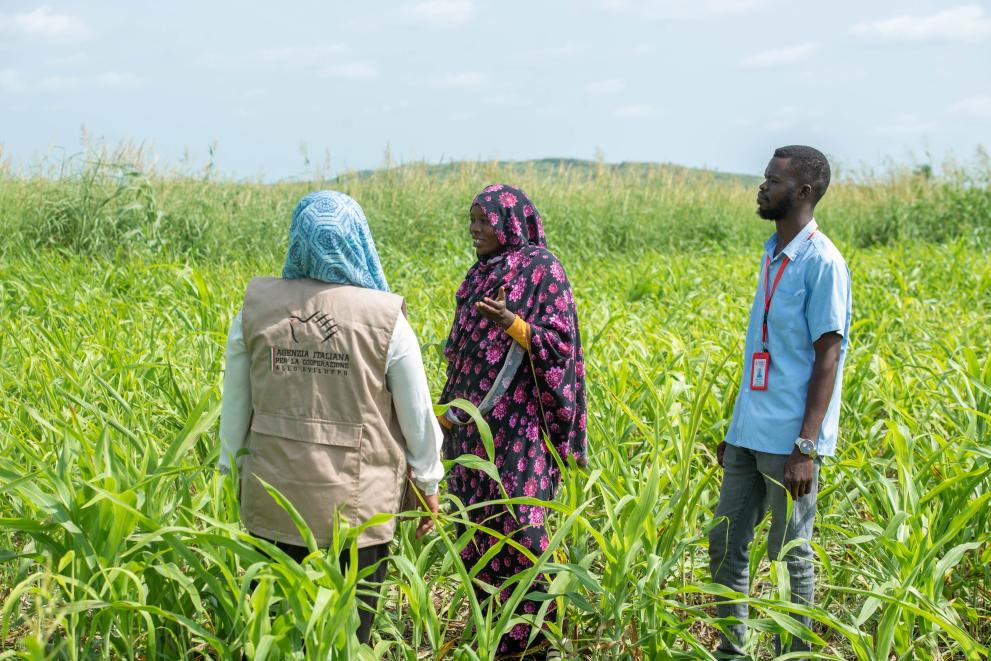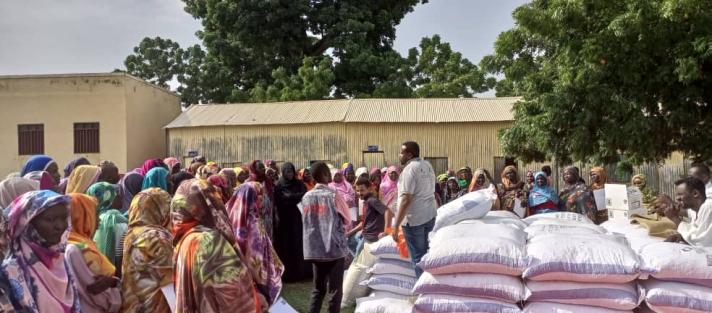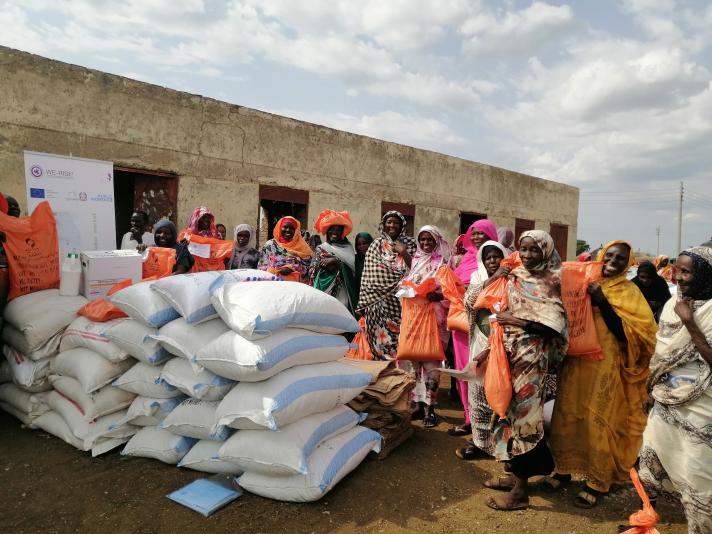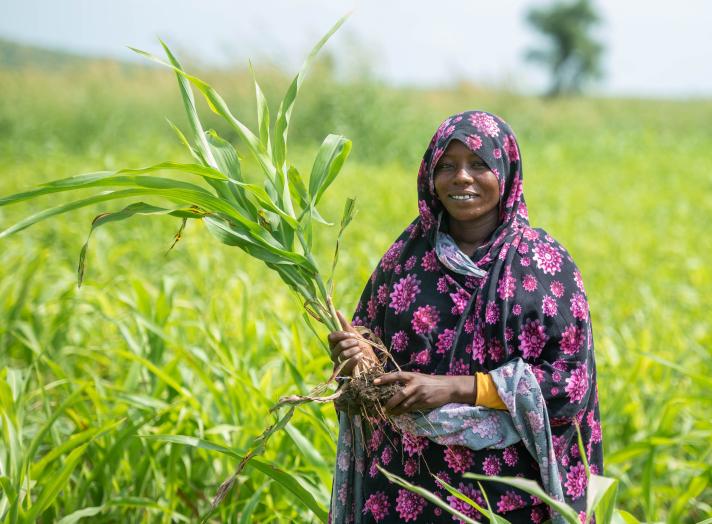
In the heart of Gedaref State, Sudan, hope is emerging thanks to "WE-RISE!" - Women’s Empowerment for Resilience, Inclusion, Sustainability, and Environment, a project funded by the European Union Emergency Trust Fund for Africa and implemented by the Italian Agency for Development Cooperation (AICS) in partnership with UN Women.
Since April 15, 2023, the Sudanese people have been grappling with the severe consequences of the ongoing armed conflict in the country between the Sudanese Armed Forces and the Rapid Support Forces The conflict has compelled over 9 million[1] individuals to abandon their homes, resulting in the largest internal displacement crisis globally. The internally displaced persons seek refuge in areas deemed safer, such as the state of Gedaref. Situated approximately 410 km from Khartoum and bordering Ethiopia to the east, Gedaref is renowned for its extensive agricultural activities. Sesame and sorghum make Gedaref vital for basic food production in Sudan. However, the conflict has negatively impacted the onset of the region's agricultural season, exacerbating high costs and shortages of necessary agricultural inputs. Additionally, the rising cost of living – with an inflation rate surpassing 300% by the end of 2023[2] – has resulted in a shortage of food and essential goods for millions of people.
In response, AICS, through the EU-funded WE-RISE project, intensified efforts to strengthen agricultural resilience, particularly supporting vulnerable women in Gedaref. In July 2023, AICS, UN WOMEN, Mercy Corps Microfinanza SRL, and CTC provided assistance to over 390 women in seven villages, distributing natural fertilizer composed of phosphorous and nitrogen, seed treatment, and herbicide. CTC, a pioneer in the agricultural sector in Sudan, provided technical support to ensure proper usage of inputs.
"The ongoing war and climate change make our lives even more challenging. In these villages, our livelihoods depend on agriculture, that is why having a good harvest is crucial. I am the head of the family and responsible for nine other people. I am not the only woman in this situation [...]. Poverty has started spreading in our villages, and it is increasingly difficult for us to sustain ourselves. Many families had to sell their harvests to cope with the famine, which has only worsened our future. The arrival of WE-RISE! brought a ray of hope! Thanks to this support, I received 25 kg of peanut, 3 kg of sorghum, and 4 kg of millet seeds, along with valuable fertilizers and pesticides." - Hanaa explains.
As illustrated by Hanaa, the overall challenge in accessing food, stemming from families' limited spending capacity, is further compounded by a significant decline in employment opportunities in the agricultural sector. Moreover, due to the ongoing crisis, farmers have faced challenges in obtaining loans or accessing bank accounts and mobile money services due to inefficiencies in the banking system.
Hanaa highlighted that “expenses related to the use of fertilizers per unit of land must be added to the costs incurred for seeds, herbicides, and planting, and therefore the overall costs are extremely high for a family like mine. We are aware of the benefits of fertilizers, and we are willing to integrate them into their practices, but we encounter financial obstacles. Some decide to cultivate without fertilizers, negatively affecting their livelihoods, as they produce lower quantities on limited land that is utilised no more than three times a year for an extended period.”
What are the project’s achieved results?
Almost 12 tons of crops have been harvested: 3,362 kg of millet, 2,764 kg of sorghum, and 6,065 kg of peanuts. The FAO reports that the five-year average of groundnut production on rainfed land in Gedaref State stands at 0.68 (tonnes per hectare. Notably, small-scale Sudanese farmers, who make up the majority of groundnut cultivators in the region, primarily employ traditional, labour-intensive methods for planting and harvesting. These farmers often lack access to advanced agricultural technology and rely on manual techniques; all characteristics shared by most beneficiaries supported through the WE-RISE! the project. However, it's important to note that the reported average yield may not accurately reflect the productivity of smallholder farmers using traditional rainfed cultivation methods. The FAO's analysis likely combines data from both rainfed mechanised and rainfed traditional production systems. Considering the limitations of traditional farming practices, smallholder farmers may achieve lower yields compared to the reported average.
Following EU funding intervention, AICS has surveyed 15 beneficiaries, and the results are positive: 14 beneficiaries out of 15 have harvested more than 315 kg of groundnuts; 8 beneficiaries sold their crops in the market, while 14 beneficiaries use the crops for food consumption.
More importantly, the intervention shaped an enabling environment for Hanaa and the other women involved, offering them the opportunity to expand their access to resources and enhance their economic prospects. The group of women, along with their families, benefited from increased production, which generated an increase in income and improved the nutritional value of their diets. During the interviews, the beneficiaries expressed a sense of independence and pride. Hanaa emphasized the recognition received for the results achieved. Hanaa's strength in a role that is not typically encouraged in women in her community and family context fuels female empowerment. Her contribution, which was also poured into the other women close to her, constitutes a step forward in the creation of new catalysts for change.
"I am fortunate to be one of the beneficiaries of the WE-RISE project…
I have saved my agricultural season from loss. I sold my production in the market and I managed to provide food to the family thanks to the additional income generated.” Hanaa says with a smile.
WE-RISE! has become a beacon of hope for many women like Hanaa and her community
Since 2021, the WE-RISE! project has aimed to empower women in the most vulnerable situations in the states of Kassala, Gedaref, and the Red Sea. Aligned with other initiatives by FAO and WFP, it aims to increase food production and mitigate food insecurity. Implemented by AICS and UN Women, funded by the EUTF, the project empowers women economically and promote positive social norms.
WE-RISE! fosters resilience and sustainability in Sudan, targeting vulnerable and socially excluded groups though financial inclusion and strengthening women’s entrepreneurial capacities. Operating until July 2024, it strives to create an enabling environment for economic empowerment.
Learn more here about the We-Rise! Project.
Details
- Publication date
- 8 March 2024
- Author
- Directorate-General for International Partnerships
- Region and Country
- Horn of Africa
- Sudan
- Thematic
- Strengthening resilience of communities
- Partner
- Agenzia italiana per la cooperazione allo sviluppo



